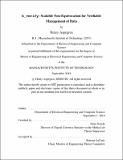b_verify : scalable non-equivocation for verifiable management of data
Author(s)
Aspegren, Henry(Henry B.)
Download1098041245-MIT.pdf (1.848Mb)
Alternative title
Scalable non-equivocation for verifiable management of data
Other Contributors
Massachusetts Institute of Technology. Department of Electrical Engineering and Computer Science.
Advisor
Neha Narula.
Terms of use
Metadata
Show full item recordAbstract
Equivocation allows attackers to present inconsistent data to users. This is not just a problem for Internet applications: the global economy relies heavily on verifiable and transferable records of property, liens, and financial securities. Equivocation involving such records has been central to multi-billion-dollar commodities frauds and systemic collapses in asset-backed securities markets. In this work we present b_verify, a new protocol for scalable and efficient non-equivocation using Bitcoin. b_verify provides the abstraction of multiple independent logs of statements in which each log is controlled by a cryptographic keypair and makes equivocating about the log as hard as double spending Bitcoin. Clients in b_verify can add a statement to multiple logs atomically, even if clients do not trust each other. This abstraction can be used to build applications without requiring a central trusted party. b_verify can implement a publicly verifiable registry and, under the assumption that no participant can double spend Bitcoin, guarantees the security of the registry. Unlike prior work, b_verify can scale to one million application logs and commit 1,112 new log statements per second. b_verify accomplishes this by using an untrusted server to commit one hundred thousand new log statements with a single Bitcoin transaction which dramatically reduces the cost per statement. Users in b_verify maintain proofs of non-equivocation which are comparable in size to a Bitcoin SPV proof and require them to download only kilobytes of data per day. We implemented a prototype of b_verify in Java to demonstrate its ability to scale. We then built a registry application proof-of-concept for tradeable commodity receipts on top of our prototype. The client application runs on a mobile phone and can scale to one million users and ten million receipts.
Description
This electronic version was submitted by the student author. The certified thesis is available in the Institute Archives and Special Collections. Thesis: M. Eng., Massachusetts Institute of Technology, Department of Electrical Engineering and Computer Science, 2018 Cataloged from student-submitted PDF version of thesis. Includes bibliographical references (pages 60-63).
Date issued
2018Department
Massachusetts Institute of Technology. Department of Electrical Engineering and Computer SciencePublisher
Massachusetts Institute of Technology
Keywords
Electrical Engineering and Computer Science.